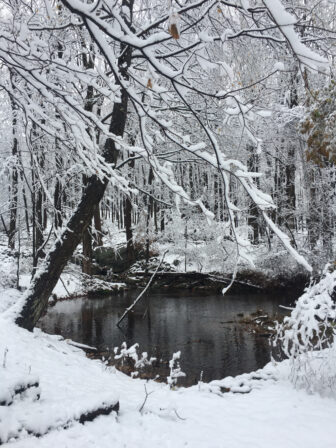What did gardening mean during a year like 2020? Huge increases in plant sales indicated that many people either started gardening for the first time or expanded their vegetable gardens and landscaping. Seeds sold out early. The combination of spending more time at home and anxiety over the food supply led many to invest their time and money in growing things.

Gardening gave me a sense of control last year, a way to channel the uncertainty into something tangible. I plant this seed, care for it, it grows and I eat a delicious tomato. I froze and dried more vegetables and herbs than ever before, feeling bolder about experimenting and more secure when I had bits and pieces to supplement meals during the winter.
I enjoyed my gardens more deeply because I spent so much more time out there in the woods than ever before on a daily basis. Watching things grow is a lovely way to pass the day. I also noticed a sharp decline in the number of butterflies, in spite of having more milkweed (the host plant for monarchs) and other habitat and nectar plants. Early reports from the western monarch migration counts show that the most recognizable butterfly is closer to extinction than ever. Let’s hope the incoming administration will finally give monarchs protection under the Endangered Species Act after more than six years of review.
Even with a new dog and a virus that was killing them off, deer romped and pillaged my gardens more than I’ve experienced in a decade of tending this landscape. Nothing was off limits; nothing not at risk of being eaten to the ground overnight. I opened the door to find a doe on the porch snacking on rudbeckia one afternoon. They were bold, brazen and brought all their friends.
Along with the deer damage, storms devastated and downed more trees than ever before on my property. See, that image of control that I get from gardening is such an illusion. Nature scoffs.
From reflections to resolutions
Plant more trees. I’m a big proponent of finding ways to make gardening less backbreaking and I’ll be planting seedling trees. Because of the deer browsing, I’ve already picked out tree tubes to protect them. After spending last summer caging the 5- to 10-year-old trees I’ve grown from seedlings to keep the deer away, the tubes are an easier solution.
This is an effort to restore the dozens of downed and damaged trees from 2020. I estimated in a column last fall that the dozen mature maples we lost in a single storm were sequestering nearly four tons of carbon emissions. Seedling trees will take decades to reach that capacity, but I’m counting on quantity to matter and, in the process, to restore ecological benefits with more diversity.
I got row covers from Santa! Along with the Seed Savers Exchange manual on seed saving and spring cover crop seeds. Gardener Christmas heaven. While I’ve expanded my garden and refined varieties of the vegetables I like to grow, I’m always behind in the spring and fall when it’s time to get everything set up and I’ve never managed to do it. With this set, all I have to do is install it. For all the new gardens from last season, this is an easy way to expand your capacity by a month or two at each end of the season.
No set of resolutions is complete without addressing soil health. Soil sequesters carbon and building it up increases that capacity. Be kind to soil. Don’t till it or dig it up more than necessary. Soil is a gardener’s best friend and needs respect. Mulch, add organic matter and amend naturally and organically. I’m afraid of finding statistics that show a correlating increase in herbicide, pesticide and chemical fertilizer sales with the increase in gardening supply sales.
Finally, let 2021 be the year that the monarch counts don’t decline. While the fate of so many native pollinators is at stake, too, monarchs are a visible and beloved reference point to get people to care about planting native species that support other at-risk species. Make informed choices when deciding what to plant. Ornamental and exotic species rarely provide the necessary habitat or food sources our native insects and wildlife require. Native plants and trees are both beautiful and ecologically important, so you don’t have to let go of your aesthetics, either.
